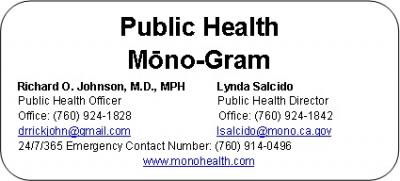Mono-Gram - Raw Milk 3/4/2016
March 3, 2016
Serious Bacterial Infections Lead to Recall of Raw Milk
Executive Summary: We believe it has been clearly demonstrated that the consumption of raw milk poses a realistic and unnecessary health threat because of possible contamination with pathogenic bacteria. It is therefore recommended that raw milk not be consumed, especially by young children, pregnant women, or any person suffering from a chronic disease or a suppressed immune system.
California officials say an outbreak has recently occurred of E. coli infections linked to unpasteurized raw milk from Organic Pastures Dairy Co., a 500 cow dairy located in Fresno, California.10 people have been confirmed with "closely related strains of Shiga-toxin producing E. coli O157:H7". Two of the patients developed hemolytic-uremic syndrome, which is potentially life threatening and can result in permanent kidney damage. Mark McAfee, founder and CEO of Organic Pastures, has been quoted as claiming that “the California Department of Public Health (CDPH) list is garbage and not accurate”.
6 of the sick people reported drinking unpasteurized raw milk from Organic Pastures Dairy Co. It is not known if the other 4 patients drank raw milk from Organic Pastures. CDPH is continuing to investigate the outbreak. It has collected a large number of samples including feces, water and raw milk, which are still undergoing evaluation at the department's Food and Drug Laboratory Branch.
The outbreak was identified and a voluntary recall was issued by the firm after the shelf-life of the product had expired. Since no product was believed to remain in the marketplace, no health
alert has been issued. However, affected product may still be in refrigerators in homes in local communities.
The cause(s) of the 4 other cases of presumed unpasteurized milk-associated gastrointestinal illnesses are not known. The classical zoonotic organisms such as Brucella abortus, Brucella melitensis, Mycobacterium bovis, Salmonella species, Listeria monocytogenes, Yersinia species,and Coxiella burnetii, are associated with the ingestion of raw milk. Non-zoonotic organisms such as Streptococcus pyogenes, Salmonella Typhi, Corynebacterium diphtheriae, Shigella species,Salmonella Paratyphi A, Salmonella Paratyphi B, enterotoxins from Staphylococcus aureus, and hepatitis A have also been associated with the ingestion of raw milk.
The impact of milk pasteurization on public health can be clearly illustrated by means of historical data. Before 1938, an estimated 25 percent of all foodborne and waterborne disease outbreaks in the USA were associated with milk, whereas nowadays, the percentage of such outbreaks associated with milk is estimated to be below 1 percent. Between 1880 and 1907, 29 milk-borne outbreaks were reported on average each year in the USA. With the adoption of pasteurization in 1938, milk-borne diseases dropped to only 46 outbreaks during the 19-year period from 1973 to 1992, corresponding to an average of 2.4 outbreaks each year. A recent report of the Centers for Disease Control and Prevention (CDC) indicates that the vast majority of milk-borne outbreaks in the USA are in states that permit the sale of raw milk.
Whereas milk quality and safety has been the topic of many research studies, raw milk still continues to be an issue for debate, which is primarily held on the internet where often non-scientifically based information circulates. In the context of the current trend toward 'consuming natural' and 'purchasing locally,' raw milk consumption is becoming more popular. This is nourished by the perception that heating destroys the nutritional and health benefits of milk, and can even induce some detrimental effects. However, due to its high nutritional value, raw milk serves as an excellent growth medium for different micro-organisms, whose multiplication depends mainly on temperature and on competing micro-organisms and their metabolic products. In order to guarantee its microbial safety and to prolong its shelf-life, milk is heat treated.
We believe that it has been clearly demonstrated that the consumption of raw milk poses a realistic and unnecessary health threat because of its possible contamination with pathogenic bacteria. It is therefore recommended that raw milk not be consumed, especially by young children, pregnant women, or any person suffering from a chronic disease or a suppressed immune system. Historical data show that the pasteurization of milk has led to improved public health, and more recent data on occasional raw milk consumption indicate the hazard of bacterial infections, which could be avoided by a heat treatment. At present, thermal treatment remains the most frequently used and most effective method to increase the microbiological safety of milk without substantially changing the nutritional value of milk or other benefits associated with raw milk consumption. Almost all arguments put forward by raw milk proponents for not heating milk, can be refuted, and the only substantial disadvantage of heating is the change in the organoleptic profile [taste] of milk. It is clear that this 'detrimental' effect of heating does not countervail the risk posed by raw milk consumption, namely of a milk-borne pathogen infection, which can have serious health consequences.
Previous recalls and foodborne illness outbreaks linked to Organic Pastures in the past decade:
October 2015: Organic Pastures raw milk recall and quarantine after CDFA [California Department of Food and Agriculture] inspectors found Campylobacter as a result of product testing conducted as part of routine inspection and sample collection at the facility.
September 2012: Organic Pastures raw milk recall and quarantine after CDFA inspectors found Campylobacter bacteria as a result of product testing conducted as part of routine inspection and sample collection at the facility.
January-April 2012: Organic Pastures products linked to campylobacteriosis outbreak. Raw milk, raw skim milk, raw cream, and raw butter were recalled and the dairy quarantined after the confirmed detection of Campylobacter in raw cream. State officials identified at least 10 people with campylobacteriosis throughout California. They reported consuming Organic Pastures raw milk prior to illness onset. Their median age was 11.5 years, with 6 younger than 18. The age range was 9 months to 38 years.
August-October 2011: Organic Pastures products linked to E. coli outbreak. A cluster of 5 young children with E. coli O157:H7 infections with matching pulse-field gel electrophoresis (PFGE) patterns was identified. Illness onsets were from 25 Aug 2011 to 25 Oct 2011. All 5 children reported drinking commercially available raw milk from a single dairy, Organic Pastures, and had no other common exposures. Investigations by the CDPH's Food and Drug Branch and the California Department of Food and Agriculture showed environmental samples collected at Organic Pastures yielded E. coli O157:H7 isolates that had PFGE patterns indistinguishable from the patient isolates.
September 2008: Organic Pastures Grade A raw cream recall and quarantine after state testing and confirmation testing detected campylobacter bacteria in the cream.
September 2007: Organic Pastures Grade A raw cream recall and quarantine following laboratory confirmation of the presence of Listeria monocytogenes bacteria. CDFA inspectors found the bacteria
as a result of product testing conducted as part of routine inspection and sample collection at the facility.
November-December 2007: Organic Pastures cows linked to Campylobacter outbreak. State officials found 50 strains of C. jejuni plus C. coli, C. fetus, C. hyointestinalis, and C. lari when they cultured feces from Organic Pastures dairy cow feces. There was only 1 patient isolate available for DNA fingerprinting, but it was identical to isolates from four cattle fecal samples collected at Organic Pastures.
September 2006: Organic Pastures linked to E. coli O157:H7 outbreak. 6 sick children were identified by state officials. 4 had culture-confirmed infections, one had a culture-confirmed infection and HUS (hemolytic uremic syndrome, which can result in kidney failure and stroke), and one had HUS only. The median age of patients was 8 years, with a range of 6 to 18 years. Organic Pastures' operators claimed the illnesses were linked to consumption of fresh spinach that was linked to a separate E. coli outbreak in 2006. However, the 5 children who consumed Organic Pastures' products who had culture confirmation were laboratory matches to each other and the CDC reported their specific E. coli isolates "differed markedly from the patterns of the concurrent E. coli O157:H7 outbreak strain associated with spinach consumption."


